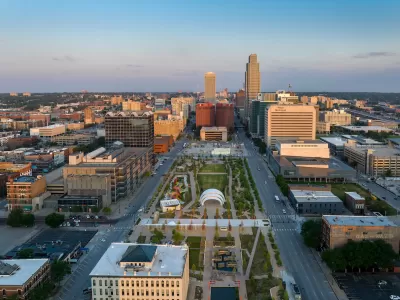The Omaha City Council has decided to reverse the transportation model adopted in the city in the 1950s, for the benefit of traffic safety and local retail activity.

The Omaha City Council has hired a consultant to explore options for reconfiguring one-way streets in the city’s downtown. According to an article by Alex McLoon, the study will consider ways to convert streets to two-way traffic to encourage walkability, traffic safety, and increased economic activity for local retailers. Planning research has shown one-way streets to produce poor results for public health and property values. One-way street conversions have also been shown as a downtown revitalization technique.
The city of Omaha committed to one-way streets in downtown in the 1950s, according to McLoon’s article.
The planning process, to be led by an unnamed consultant, is expected to take 18 months, with results delivered to the Omaha City Council in 2024.
FULL STORY: Omaha looks into reconfiguring one-way streets downtown

Montreal Mall to Become 6,000 Housing Units
Place Versailles will be transformed into a mixed-use complex over the next 25 years.

Planetizen Federal Action Tracker
A weekly monitor of how Trump’s orders and actions are impacting planners and planning in America.

DARTSpace Platform Streamlines Dallas TOD Application Process
The Dallas transit agency hopes a shorter permitting timeline will boost transit-oriented development around rail stations.

Study: 4% of Truckers Lack a Valid Commercial License
Over 56% of inspected trucks had other violations.

Chicago Judge Orders Thousands of Accessible Ped Signals
Only 3% of the city's crossing signals are currently accessible to blind pedestrians.

Philadelphia Swaps Car Lanes for Bikeways in Unanimous Vote
The project will transform one of the handful of streets responsible for 80% of the city’s major crashes.
Urban Design for Planners 1: Software Tools
This six-course series explores essential urban design concepts using open source software and equips planners with the tools they need to participate fully in the urban design process.
Planning for Universal Design
Learn the tools for implementing Universal Design in planning regulations.
City of Mt Shasta
City of Camden Redevelopment Agency
City of Astoria
Transportation Research & Education Center (TREC) at Portland State University
US High Speed Rail Association
City of Camden Redevelopment Agency
Municipality of Princeton (NJ)





























